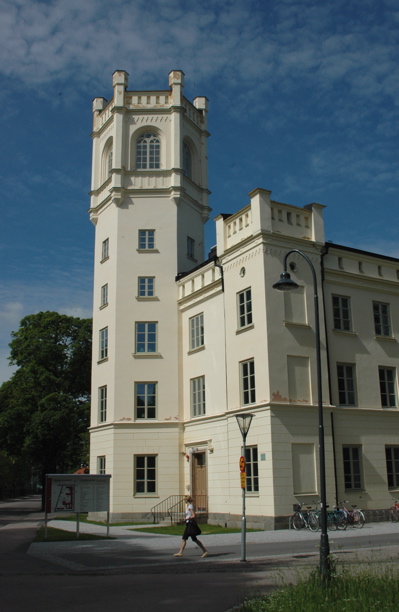
– Ongoing Research Projects connected to South Asia
– Collaboration project between Uppsala University and Calcutta University
– Linnaeus Palme collaboration project 2012-13
– Collaboration project between Uppsala University and Delhi University
– Earlier South Asia related research at the department
Postal address: Box 628, SE-751 26 Uppsala, Sweden
Visiting address: Thunbergsvägen 3 A, Uppsala (close to Engelska Parken)
Web page: http://www.hist.uu.se/
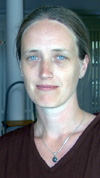 Contact person: Professor Gunnel Cederlöf, phone +46 (0)18 471 1543. Personal web page,
Contact person: Professor Gunnel Cederlöf, phone +46 (0)18 471 1543. Personal web page,
Since 1 January 2014, Gunnel Cederlöf is on leave from the department. Instead she has become connected to the Division of History of Science, Technology and Environment at the KTH Royal Institute of Technology in Stockholm (more information) and Guest Professor at the Centre for Concurrencies in Colonial and Postcolonial Studies, Linnaeus University, Växjö.
In an interesting development she is also currently a Visiting Professor at the School of Humanities and Social Sciences at Shiv Nadar University in Gautam Buddha Nagar, Uttar Pradesh, India. The position lasts five years (2014-2019), and facilitates collaboration between KTH Royal Institute of Technology and Shiv Nadar University. Together the two universities will collaborate in the broad field of environmental humanities and social sciences. The initiative will specifically focus on research and higher education.
Shiv Nadar University is a multi-disciplinary, student-centric, research-focused university established in 2011. It offers a full range of academic programs at the undergraduate, postgraduate and doctoral level. SNU’s multi-disciplinary curriculum provides students a strong foundation in disciplines in the humanities and social sciences, natural sciences, technology and engineering studies, communications and management, while enabling them to gain mastery of a subject of their choosing.
Dr. Cederlöf was Chairperson of SASNET’s board during the period 2007–10. More information.
Research connected to South Asia
Gunnel Cederlöf defended her doctoral dissertation on ”Bonds lost: Subordination, conflict and mobilisation in rural south India c. 1900-1970”, on the transformation of rural social relations in the highlands of south India during a period of rapid agricultural change in 1997 Read an abstract of the thesis.
After working primarily in the Dept. of Cultural Anthropology and Ethnology, Dr. Cederlöf returned to the Dept. of History on 1 July 2006.
In recent years she has done research on Indian modern (18th and 19th Century) history, with a focus on environmental history, political ecology, rural development, mission history, socio-economic transformation, caste and labour issues.
 This has resulted in several articles and books, among them three monographs – ”Bonds lost” (her PhD thesis); “Landscapes and the Law: Environmental Politics, Regional Histories, and Contests over Nature” (more information below); and soon to be published ”Founding an Empire on India’s North-eastern Frontiers, 1790-1840: Climate, Commerce, Polity”, New Delhi: Oxford University Press, Autumn 2013. More information about the coming book.
This has resulted in several articles and books, among them three monographs – ”Bonds lost” (her PhD thesis); “Landscapes and the Law: Environmental Politics, Regional Histories, and Contests over Nature” (more information below); and soon to be published ”Founding an Empire on India’s North-eastern Frontiers, 1790-1840: Climate, Commerce, Polity”, New Delhi: Oxford University Press, Autumn 2013. More information about the coming book.
Other publications include ‘The Politics of Caste and Conversion: Conflicts among Protestant Missions in Mid-Nineteenth Century India’ (Swedish Missiological Themes, 2000); ‘Social Mobilisation among People Competing at the Bottom-Level of Society: The Presence of Missions in Rural South India c. 1900-1950’ in Robert Frykenberg’s ”Christians and Missionaries in India: Cross-Cultural Communication since 1500” (Eerdmans/RoutledgeCurzon Press 2003); and Political Visions and Social Realities in Contemporary South India (with Lars Berge, Dalarna University International Studies Series 2003).
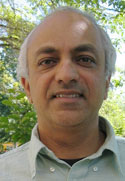
Between 2001-2005 Gunnel Cederlöf was engaged in a research collaboration with Professor K. Sivaramakrishnan (photo to the left), previously Director for the South Asia Center at the University of Washington, Seattle, USA, but now Professor at the Department of Anthropology, Yale University, New Haven, Connecticut, USA. He is also Dinakar Singh Professor of India and South Asian Studies; Professor of Anthropology and Forestry &Environmental Studies; and co-Director of the Programme in Agrarian Studies.
In 2005 Cederlöf and Sivaramakrishnan edited an advanced volume on ”Ecological Nationalisms: Nature, Livelihoods and Identities in South Asia”. It was published by Permanent Black (Delhi) and University of Washington Press (Seattle). The book has recently been published also as paperback. More information on the book.
Prof. Sivaramakrishnan’s research interests span environmental history, political anthropology, cultural geography, development studies, and science studies. He has published widely in the leading journals of all these disciplines and inter-disciplinary fields, with a regional focus on south Asia, especially India. Over the last fifteen years much of Sivaramakrishnan’s research program has dealt with the colonial and contemporary history and anthropology of forests and wildlife conservation in eastern India. Prof. Sivaramakrishnan has come to Uppsala and lectured at courses at the department.
For five years, Gunnel Cederlöf was employed as a researcher at the Dept. of Cultural Anthropology and Ethnology. There she was involved in a joint research project titled ”Claims and Rights: Power and Negotiations over Nature in India: An Anthropological and Historical Study” with the researcher Dr. Beppe Karlsson. The project was related to the emerging multi-disciplinary field studying Nature–Society relations and drawing particularly on recent debates within environmental history and political ecology. The main aim of the project was to investigate the interplay between the state and indigenous communities in India in relation to claims and rights in forest land and natural resources. It had three sub-projects, two by Gunnel Cederlöf, and one by Beppe Karlsson. More information about the main research project.
Within the framework of this ”Claims and Rights” project, Gunnel Cederlöf carried out a research project titled ”Negotiating Rights: The Agency of the Colonial Subject in Early 19th Century South India”, dealing with the early, colonial expansion into the marginal but resource-rich forest areas of the Indian subcontinent. The complexity of the process which appears when the many violent conflicts of the east and north India are contrasted with the long-lasting and uneven negotiations in the legal spheres in the south. The major work has been located in the Nilgiri Hills in the Western Ghats in south India, investigating the different notions of land and natural resources, the negotiations over access to these and the establishment of ”rights” in legal codes during the period 1790–1860. More information on the project.In recent years, Professor Cederlöf has worked on a research project entitled ” The Environmental History of Law. State making and land conflicts in colonial India” funded by a research grant from Sida’s Developing Country Research Council (U-landsforskningsrådet) .
Project abstract: The project moves within the broad problematic of the formation of modern states in colonial settings and focuses particularly on South Asia under British rule. It targets the relationship between man and nature as it was legally configured and codified in marginal areas. The disputed key questions of early colonial rule – of overeignty, public good and aboriginal right – will remain central in the project, and special emphasis will be given to the role of state-subject formation in territories under colonial rule (including both state formation and subject formation) and to popular resistance to the implementation of law. The project will investigate three aspects of the processes in which access to and authority over land and natural resources were legally codified. First, the contradictory notions of ruler/subject and man/nature relationships, which formed the discursive reference for debates within the British East India Company (EIC) and the British Parliament on how to establish legitimate sovereignty in the conquered territories. Second, the incompatible positions of, on the one hand, the debates on legal principles in the EIC and parliament and, on the other hand, the implementation of law as it was shaped in administration and actual conflicts in the Indian territories. This aspect grasps particularly the regional character, the adaptation to existing legal systems, and the vast pragmatism of legal practices. And, third, the common rhetoric of historical narratives substantiating and legitimising arguments of man’s rights in nature, i.e. the constant references made to history as a valid discourse for ascertaining particular rights, authority or sovereignty in land. The project will broadly cover 1800-1860 and focus on two regions within the Madras and Bengal presidencies.
Gunnel Cederlöf’s book titled ”Landscapes and the Law: Environmental Politics, Regional Histories, and Contests over Nature” (based on the research projects presented above) was published by Permanent Black in Delhi in April 2008. In the book, Dr. Cederlöf examines the role of law in consolidating early colonial rule in India from the perspective of people’s access to nature in forests and hill tracts. It is concerned thus with the social history of legal processes and the making of law. The book is focused equally on the multitude of colliding claims to land and resources, and the complex ways by which customary rights in nature are redefined and codified for the purpose of securing and legitimizing colonial sovereign rule. More information about the book.
Gunnel Cederlöf is involved in a ongoing collaboration project between Uppsala University and Calcutta University within the field of Environmental History. More information on the Kolkata collaboration project, below.

During the period 2006–2008, she was also the Director for SALT, Uppsala University’s Forum for Advanced Studies in Arts, Languages and Theology. SALT aims at stimulating cross-boundary collaboration within the English Park Campus through activities such as seminars, lectures, courses, workshops, etc. in which contents and forms of research are debated and further developed. More information on SALT.
In the 2008 edition of Uppsala University’s yearly magazine Horisont, an article featured the activities of SALT and the role of its Director, Dr. Gunnel Cederlöf. Read the article (as a pdf-file, in Swedish).
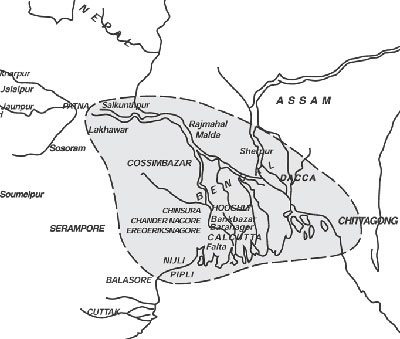 In end-October 2010, Gunnel Cederlöf received a new major three-years grant for the period 2011-13 from the Swedish Research Council for research within the fields of Humanities and Social Sciences. She has been awarded SEK 2.8 m for a project entitled ”The Formation of Subjects and Citizens. On Borders and Constitution under Colonial Rule in Northeastern Bengal”.
In end-October 2010, Gunnel Cederlöf received a new major three-years grant for the period 2011-13 from the Swedish Research Council for research within the fields of Humanities and Social Sciences. She has been awarded SEK 2.8 m for a project entitled ”The Formation of Subjects and Citizens. On Borders and Constitution under Colonial Rule in Northeastern Bengal”.
Abstract: The project focuses on the formation of new polities and ruler–subject relations as a result of British colonial conquest of northeastern Bengal and the neighbouring autonomous states in the late18th and early 19th centuries. It emphasises ecological and climatic structuring conditions and is a contribution to research on changing spatial relations and transactions, the transformation of hill–plain relations, and collisions between synoptic political visions and knowledge systems, and their implementation on particular landscapes and people.
Particular attention is given to the time and place bound formation of law for the control and access of land and natural resources. In the longer perspective, these processes reveal the embryo of that which formed the (colonial) state. It is expected to shed new light on the formation of the region today known as Northeast India and its separation from Bengal. The change is mostly understood in view of the last 100 – 150 years. This project draws attention to socio-political and economic preconditions of a much earlier date. It is a contribution to the study of the formation of the British Empire in the fields of environmental and legal history.
The project is presented in a book, ”Founding an Empire on India’s North-eastern Frontiers, 1790-1840: Climate, Commerce, Polity” published by Oxford University Press, Delhi in the Autumn 2013.
Abstract: Moving away from the subcontinental Indian mainland to the varied social ecologies of Sylhet, Cachar, Manipur, Jaintia, and Khasi Hills, this study offers a much-needed reframing of regional histories of South Asia. It explores the unsettled half-century from the 1790s to the 1830s when the British East India Company, in its attempt to control commercial trade routes connecting India, Burma, and China, strove to establish a colonial administration over the north-eastern frontiers.
A region where the river courses shifted and cultivated fields turned into lakes in the monsoons, and seasonal changes required highly flexible and varied livelihood strategies, the East India Company stepped into the shoes of the existing Mughal administration with great difficulty. The book explores both the enabling and constraining conditions of climate and ecology to understand the role of daily administration in shaping subject formation. Challenging the conventional understanding of the founding of the colonial state in India, it reconnects histories of space and polities to provide rare insights into the lesser-known formative years of the East India Company rule.
Professor Maria Ågren is working on a research project on ”Gender and Economic Development in a Comparative Early Modern Perspective”, but she is also involved in the collaboration project with Calcutta University (see below). In connection with the Post-centenary Golden Jubilee Celebration (150 years) of the founding of Calcutta University, the Dept. of History organised a seminar on ‘Environment, livelihood and development’ in Kolkata 6–8 March 2006. Prof. Ågren participated in this seminar. More information on the seminar (as a pdf-file).
Professor Margaret R. Hunt works on the English East India Company in the 17th century. She has written a book of primary sources on 17th-century Bombay. From 2014 she administers the Uppsala U./Calcutta U. exchange through the Linneaus-Palme program, see below
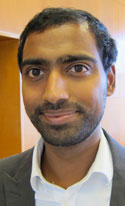
Dr. Henrik Chetan Aspengren returned to Sweden in 2010 after living a few years abroad (three years in London, where he did his PhD; one year in Islamabad, Pakistan; and 2,5 years in Geneva, Switzerland).
In January 2010, he was awarded a PhD from the Dept. of Politics and International Studies, School of Oriental and African Studies (SOAS), University of London, UK for a thesis entitled ”Social Imperialism – And how it was applied in the Bombay Presidency, 1895–1925”. The viva took place on 12 January 2010, with Dr Vernon Hewitt, University of Bristol, and Prof. Sanjay Seth, Goldsmiths, University of London, being the examiners.
In the thesis, Aspengren deals with the making of the ’the social’ as a space of government intervention, amid growing urban unrest and assertive nationalism in colonial, western India. It discusses the influence of social liberalism, and sociology, on the local British administration in the Bombay Presidency, and the implementation of actual projects of sanitation, housing and education. Read an abstract of the thesis.
On 20 October 2011, the Swedish Research Council awarded Henrik Chetan Aspengren SEK 2.067 m as a research grant for three years (2012-14) for a project entitled ”Knowledge as colonial dissent: social science and political argument, Western India 1870–1940”. It will be carried out at the Dept. of History. In the new project he will explore in innovative ways how political argument of dissent towards British authorities in the Bombay Presidency, Western India, 1870-1940, shifted from being mainly inspired by religion or custom, to become infused with social science concepts and data. More information about the project.
His three main research fields are:
1. The history of social science in colonial India, 1820-1880
2. Indian revolutionaries abroad, 1900-1930
3. Politics in contemporary Pakistan

On Thursday 17 November 2011, Henrik held a seminar at Lund University on ”Pakistan – History, Politics, Society”. The seminar was jointly organised by SASNET, the Lund University Master in International Development and Management programme (LUMID) and ABF Lund. Venue: Geocentrum, Flygeln, Sölvegatan 10, Lund.
The seminar focused on his Swedish language book ”Pakistan – Upprorens land” that was published on 1 April 2011 by Norstedts. Dr. Aspengren has previously lived for a longer period in Pakistan, and in this book he mixes writings on South Asian history with travel writing. Through detailed descriptions on life in, for example, a Sufi-shrine in Sindh, or a village of land less peasants in Malakand close to the border between Pakistan and Afghanistan, Aspengren discusses a wide range of topics: the Pakistani military’s role in politics; struggles for women’s rights, democracy, or land rights; religious tolerance and extremism. As such, the book provides social and historic context to events reported in the news.
More information on the new book. See the poster for the Lund University seminar.
In 2008, Henrik Chetan Aspengren was the coordinator for the international research conference “Nature, Knowledge, Power” that was held in Uppsala 15-17 August. SASNET was the main funder and organiser for this conference, that was jointly hosted by the and Uppsala Centre for Sustainable Development (CSD), Uppsala University; and the Dept. of Urban and Rural Development, Swedish University of Agricultural Sciences (SLU). Full information about the conference.
Collaboration project between Uppsala University and Calcutta University
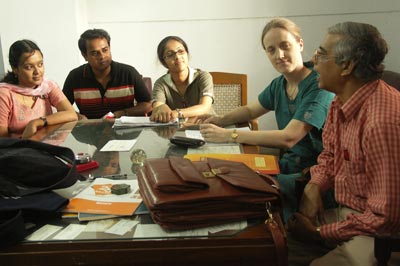 Gunnel Cederlöf, while working at the Dept. of Cultural Anthropology, established a collaboration with Professor Arun Bandopadhyay, Nurul Hasan Professor of History, University of Calcutta, Kolkata, India. (On photo).
Gunnel Cederlöf, while working at the Dept. of Cultural Anthropology, established a collaboration with Professor Arun Bandopadhyay, Nurul Hasan Professor of History, University of Calcutta, Kolkata, India. (On photo).
They initiated the formation of a formal collaboration between Uppsala University’s Dept. of History and Dept. of Cultural Anthropology and Ethnology, and Calcutta University’s Dept. of History on the issue of Environmental History.
In August 2004 Gunnel Cederlöf received SEK 75 000 as a SASNET planning grant for the educational project ”Environmental History as an Emerging Field of Education and Research. Planning for a collaboration between Uppsala University and Calcutta University”.
The aim of the Calcutta-Uppsala programme is to build research capacity and strengthen existing research and education environments within the field of environmental history. The programme will have as a main goal to increase the interest in and knowledge of environmental history in South Asia through research-based education.
As an off-spin of the programme in Uppsala, a general interest in South Asia is expected to expand both in the departments where the programme is to be located, i.e. the departments of history and of cultural anthropology and ethnology, and in the departments with which the Uppsala core group cooperates.
The SASNET planning grant was used for meetings in Uppsala and Kolkata during the Winter 2004/05. Professor Arun Bandopadhyay (who is actively working and supervising research students on Environmental History, besides being Associate Editor of The Calcutta Historical Journal, photo to the left) visited Uppsala in November 2004 along with two colleagues. During the visit he gave a guest lecture on ”Forest, Land Use and Water in Colonial South Asia: A Few Issues from Agrarian and Environmental History”.
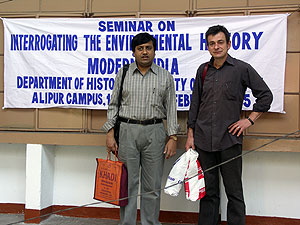 In February 2005 Gunnel Cederlöf, and Beppe Karlsson from the Dept. of Cultural Anthropology and Ethnology went to Kolkata for further discussions, had a meeting with the Vice-chancellor of Calcutta University, and also took part in a seminar on environmental history. Gunnel presented a paper on ”Conflicting Constructions of Community. Land Conflicts in 19th Century Nilgiris” (it has since been published in the Calcutta Historical Journal). Beppe can be seen on the photo to the right, along with Rajsekhar Basu (photo to the right), at that time PhD candidate at the Dept. of History, Calcutta University. (He defended his doctoral dissertation in the Fall 2005, with a thesis called ”The Socio-Cultural Transformation of Two Depressed Castes: The Cases of the Pulayas and Payaiyars in Southern India (c. 1850-1956)”.
In February 2005 Gunnel Cederlöf, and Beppe Karlsson from the Dept. of Cultural Anthropology and Ethnology went to Kolkata for further discussions, had a meeting with the Vice-chancellor of Calcutta University, and also took part in a seminar on environmental history. Gunnel presented a paper on ”Conflicting Constructions of Community. Land Conflicts in 19th Century Nilgiris” (it has since been published in the Calcutta Historical Journal). Beppe can be seen on the photo to the right, along with Rajsekhar Basu (photo to the right), at that time PhD candidate at the Dept. of History, Calcutta University. (He defended his doctoral dissertation in the Fall 2005, with a thesis called ”The Socio-Cultural Transformation of Two Depressed Castes: The Cases of the Pulayas and Payaiyars in Southern India (c. 1850-1956)”.
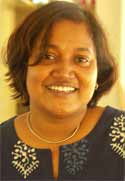 The Department of Cultural Anthropology and Ethnology initiated a formal Linneaus Palme exchange programme with the Dept. of History, Calcutta University in 2005. During September–October 2005 Professor Arun Bandopadhyay and other researchers from Calcutta University came to Uppsala, and lectured frequently at various departments at the university, on Environmental History and Political Ecology. Then PhD Candidate Sanjukta Das Gupta (photo to the left), specialized in social conflicts over forest resources in colonial India, was also part of the team coming from Kolkata (more information).
The Department of Cultural Anthropology and Ethnology initiated a formal Linneaus Palme exchange programme with the Dept. of History, Calcutta University in 2005. During September–October 2005 Professor Arun Bandopadhyay and other researchers from Calcutta University came to Uppsala, and lectured frequently at various departments at the university, on Environmental History and Political Ecology. Then PhD Candidate Sanjukta Das Gupta (photo to the left), specialized in social conflicts over forest resources in colonial India, was also part of the team coming from Kolkata (more information).
Sanjukta has since defended her PhD and works at the Dept. of History, University of Calcutta. After working for a year as Indian Council for Cultural Relations (ICCR) India Chair Professor at Dipartimento, Istituto Italiano di Studi Orientali, Sapienza University of Rome, Italy, she now has a permanent position there. More information.
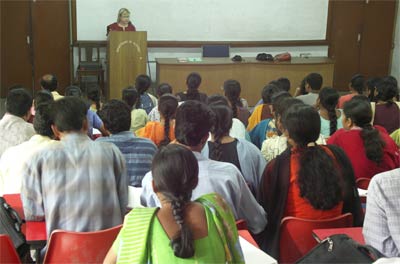 The Linneaus Palme programme, that now has now been taken over by the Dept. of History, was constricted to an exchange of teachers during the first year (2005-06), but from the second year the the programme also included an exchange of students. During the Spring 2006 three teachers from the Uppsala University went to Kolkata to teach, namely Gunnel Cederlöf, Maria Ågren and the linguist Mirja Juntunen (seen on the photo to the right lecturing for Kolkata students of history .
The Linneaus Palme programme, that now has now been taken over by the Dept. of History, was constricted to an exchange of teachers during the first year (2005-06), but from the second year the the programme also included an exchange of students. During the Spring 2006 three teachers from the Uppsala University went to Kolkata to teach, namely Gunnel Cederlöf, Maria Ågren and the linguist Mirja Juntunen (seen on the photo to the right lecturing for Kolkata students of history .
They also participated in an International, interdisciplinary conference on ”Environment, livelihood and development in South Asia: Historical Probing in a comparative framework” held at Calcutta University 6–8 March 2006. The seminar was organised as a part of the Post-centenary Golden Jubilee Celebration (150 years) of the University of Calcutta beginning from January 2006 onwards, as it has been decided to hold several academic programmes in the University throughout the whole year of 2006-07.
Scholars from many countries were invited to participate and present papers in the seminar that was organised by Calcutta University’s History Department in collaboration with the Maulana Azad Khan Institute of Asian Studies (MAKAIAS), the Institute of Development Studies, and the Netaji Institute of Asian Studies. More information on the conference (as a pdf-file)
During February 2010, Gunnel Cederlöf and a then colleague at the department, Dr. David Ludvigsson (from 2011 at Linköping University), spent time at Calcutta University, as guest teachers on MA and MPhil levels.
They also participated in the International Workshop on ‘Learning in the Past, Research Agendas for the Future: Connecting Histories of Education 1700–2000,’ that was held in Kolkata 3–5 February 2010. The workshop was jointly organized by the International Standing Conference for the History of Education (ISCHE) and the Institute of Development Studies Kolkata (IDSK). The focus rests on the period from the eighteenth century onwards, and the workshop proposes to bring together Asian historians of education and those from other continents. The conference proposes to build up a conversation between scholars from all over the world. More information.
Linnaeus Palme collaboration
 The Linnaeus-Palme International Exchange Programme, established in 2005 (see above), received continued funding for the period 2015-16 with SEK 219 071. More information about South Asia related Linnaeus Palme programme grants for 2015-16.
The Linnaeus-Palme International Exchange Programme, established in 2005 (see above), received continued funding for the period 2015-16 with SEK 219 071. More information about South Asia related Linnaeus Palme programme grants for 2015-16.
The coordinator on the Swedish side was from the srat Professor Gunnel Cederlöf, assisted by Magnus Svensson, whereas the coordinator on the Indian side was Professor Arun Bandopadhyay, with Shouvik Mukherjee assisting. It was the starting point for a Linnaeus Palme collaboration project that has successfully run for many years. From 2014, the coordinator on the Swdish side is however Professor Margaret R. Hunt.
Altogether 10 Uppsala teachers went to Kolkata during the period 2005-2012, and almost the same number of Kolkata teachers went to Uppsala.
Some of the Uppsala teachers who spent time teaching in Kolkata have been, besided Gunnel Cederlöf, Dr. Iva Lucic in the spring 2012, and Dr. Fredrik Thomasson in January-February 2013. (Photo of Gunnel and Fredrik with MPhil students in Kolkata)
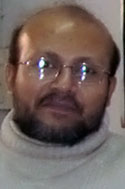 Professor Amit Dey, Reader and Head of the Department of History, University of Calcutta, again spent three weeks at Uppsala University, as part of this collaboration programme, in March 2013.
Professor Amit Dey, Reader and Head of the Department of History, University of Calcutta, again spent three weeks at Uppsala University, as part of this collaboration programme, in March 2013.
During a previous stay in Uppsala in 2010, he also lectured at the Institute for Linguistics and Philology on ”Prince Dara Shukoh and Islamic Mysticism in India and Iran”, about the prince who was once close to become a Mughal Emperor, and strengthened India’s eclectic traditions and many later day thinkers were influenced by his thought. Dr. Dey tried to explore the commonalities between Indian and Persian Sufism, referring to the likes of Rumi and exploring how this sharing of mystical ideas enriched both the countries. More information.
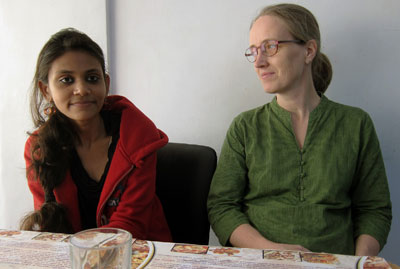 All University of Calcutta teachers also regularly visit Linköping University and hold guest lectures there, an arrangement due to the fact that a couple of the Swedish teachers being part of the Uppsala programme (David Ludvigsson and Henrik Ågren) now work there.
All University of Calcutta teachers also regularly visit Linköping University and hold guest lectures there, an arrangement due to the fact that a couple of the Swedish teachers being part of the Uppsala programme (David Ludvigsson and Henrik Ågren) now work there.
Students also go to the partner university every year in both directions. In the Spring 2013), one Uppsala student, Linnea Ollaiver, studied at University of Calcutta. In Kolkata, one former exchange student to Uppsala – Sinjini Dutta – is now in charge of taking care of the Swedish students coming to University of Calcutta. Sinjini was a guest student in Uppsala in the spring 2011. (Photo of Sinjini and Gunnel).
Collaboration project between Uppsala and Delhi universities
A networking project between researchers working within the broad field of environmental history at the universities in Uppsala, Sweden and Delhi, India was initiated in early 2007. The initiative came as an answer to the needs for better information and collaboration between researchers who work in the broad field of environmental studies in the different universities and research institutes in Uppsala and Delhi. The network is in a phase of building up structures and received a planning grant from the Swedish Research Council in 2008, through the Swedish Research Links programme. More information.
Once fully established, it will function through workshops, lectures, publications, and a website. It will further provide PhD students with external supervision and may also channel other information which is useful for pursuing research studies. A one-day workshop, on ”Environmental History: Past and Present”, was held at Delhi University in November 2008.
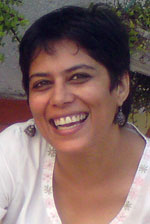
The network, entitled Uppsala-Delhi Ecology and Society Network, is co-ordinated by Gunnel Cederlöf at Uppsala University, and Prof. Mahesh Rangarajan, Delhi University. Researchers involved in the setting up of the network are employed at Uppsala University, the Swedish University of Agricultural Sciences (SLU), Delhi University, Jawaharlal Nehru University (JNU), Delhi School of Economics, Delhi Institute of Economic Growth, Jamia Millia Islamia University, and Ambedkar University Delhi.
Dr. Asmita Kabra (photo to the right) administers a Google group for the Ecology and Society Network, providing news and information. Contact her to join the group.
On 13 March 2010, the Uppsala-Delhi Ecology and Society Network held another workshop in New Delhi. The workshop was funded by a grant from the Swedish Research Council, and was held at JNU. The title of the Workshop was ‘Understanding Global Environmental Change: the South Asian Challenge‘ and it featured six academic papers from Indian and Swedish scholars, followed by discussions. The three Swedish presenters were Dr. Gunnel Cederlöf herself; Dr. Pernille Gooch, Division of Human Ecology, Lund University; and Dr. Fiona Rotberg, Dept. of Government, Uppsala University.
In February 2013, another jointly organised workshop entitled “‘Frontier India’ and the Northeast” was held in Delhi. It was hosted by Nehru Memorial Museum and Library in Delhi, and emphasised emerging scholarship and a critical engagement with the ways in which our understanding of the region’s present and pasts is conceptualised. The conveners consisted of an Indo-Swedish team, Professor Sajal Nag and Dr. Suryasikha Pathak from Assam University in Silchar, along with Professor Gunnel Cederlöf. Keynote lectures were delivered by Prof. Philippe Ramirez, CNRS Paris, and Professor Emeritus Imdad Hussain, North Eastern Hill University (NEHU), Shillong. More information.
(Photo from the Delhi conference)
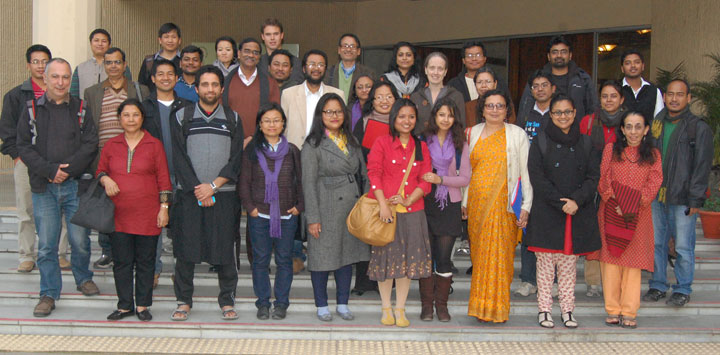
2008 Uppsala research conference on “Nature, Knowledge, Power”
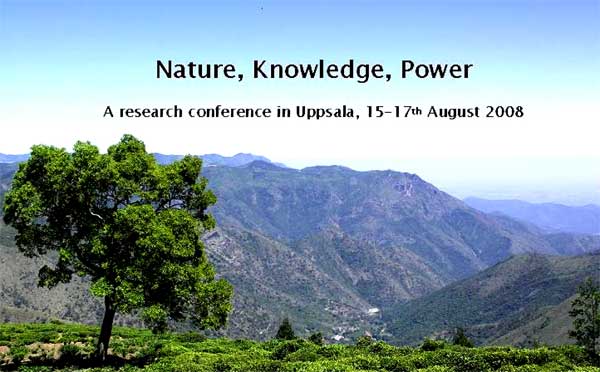 An international research conference entitled “Nature, Knowledge, Power” was held in Uppsala 15-17 August 2008. It was hosted by the Dept. of Urban and Rural Development at the Swedish University of Agricultural Sciences (SLU), but the organising committee was chaired by Gunnel Cederlöf. SASNET was the main funder and organiser, whereas FORMAS and DevNet at the Centre for Sustainable Development, Uppsala University contributed with grants. The conference administrator was Henrik Chetan Aspengren.
An international research conference entitled “Nature, Knowledge, Power” was held in Uppsala 15-17 August 2008. It was hosted by the Dept. of Urban and Rural Development at the Swedish University of Agricultural Sciences (SLU), but the organising committee was chaired by Gunnel Cederlöf. SASNET was the main funder and organiser, whereas FORMAS and DevNet at the Centre for Sustainable Development, Uppsala University contributed with grants. The conference administrator was Henrik Chetan Aspengren.
The conference brought together researchers from different academic fields, concerned with questions of environment and society under present and historical conditions.
About forty researchers and research students equally from South Asian and European universities participated in the conference and 25 full research papers were presented papers within five panels: “Energy: renewable and sustainable?”, “Competing rights, codifying law”, “Community rights under neoliberal rule”, “Who needs conservation? Nature, people, survival”, and “Ideologies of environmental change: from imperial modernization to postcolonial social equality?”.
The keynote speakers were Dr. Amita Baviskar from the Institute of Economic Growth at Delhi University, India and Prof. Arun Agrawal, University of Michigan. At the conference, an inter-disciplinary network of researchers focusing on South Asian environmental issues began to emerge. More information about the Uppsala conference.
Earlier South Asia related research at the department
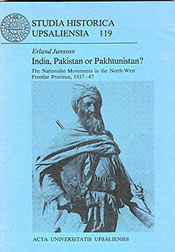 Except Gunnel Cederlöf there are presently no researchers at the department working on South Asia related projects. However during the 1980’s Erland Jansson worked at the department, doing research on Pakistan and Afghanistan. He defended his doctoral dissertation on ”India, Pakistan or Pakhtunistan: The Nationalist Movement In the North-West Frontier Province, 1937-47” in 1981.
Except Gunnel Cederlöf there are presently no researchers at the department working on South Asia related projects. However during the 1980’s Erland Jansson worked at the department, doing research on Pakistan and Afghanistan. He defended his doctoral dissertation on ”India, Pakistan or Pakhtunistan: The Nationalist Movement In the North-West Frontier Province, 1937-47” in 1981.
Together with Professor Bo Huldt – now at the Dept. of Security and Strategic Studies, Swedish National Defence College (Försvarshögskolan) but then the Director of the Swedish Institute of International Affairs – Erland Jansson in 1988 published a book called ”The Tragedy of Afghanistan”; and in 1993 he edited a volume on ”State, Nation and Nationalism in Asia”.
At about the same time Erland Jansson left the Dept. of History. He is now working as a Research Editor at Södertörn University College Library in Huddinge, south of Stockholm. Occasionally he still lectures at the Division for Iranian languages, Department of Linguistics and Philology, Uppsala University.